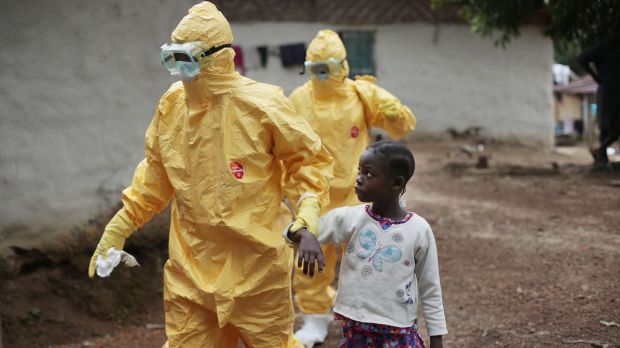
Hand and glove: Nine-year-old Nowa Paye is taken to an ambulance after showing signs of Ebola infection in the village of Freeman Reserve, about 50 kilometres north of Monrovia, Liberia. Photo: AP
Time magazine has named “Ebola fighters” its Person of the Year for their “tireless acts of courage and mercy”.
“Ebola is a war, and a warning,” Time editor Nancy Gibbs wrote in announcing the magazine’s choice for most influential newsmaker of 2014. “The global health system is nowhere close to strong enough to keep us safe from infectious disease, and ‘us’ means everyone, not just those in faraway places where this is one threat among many that claim lives every day. The rest of the world can sleep at night because a group of men and women are willing to stand and fight.”
By December 7 the toll in the Ebola epidemic had risen to 6388 deaths out of 17,942 cases, the World Health Organisation said.
In Liberia, a Senate election, already postponed once because of the Ebola epidemic, has been rescheduled for December 16, and there is a chance it could be postponed again.
President Ellen Sirleaf, speaking in an interview late last month at her presidential mansion in Monrovia, said the elections should go forward as scheduled, in part to help avert a constitutional crisis. “By January, 50 per cent of the Senate would have no mandate,” she said.
However, she expressed concern about the risks of mass gatherings that could spread Ebola just as Liberia, one of the three West African countries at the centre of the outbreak, had begun to show signs of gaining momentum in fighting it.
Mrs Sirleaf said she was particularly troubled by a rally held in November in which thousands of young supporters crammed together for hours along Monrovia’s main thoroughfare. “Those people are interacting and interacting without caution, so anyone there who is infected can easily pass it to dozens of others without knowing it,” she said. “We have to have more rigorous containment of the campaigning process.”
Mrs Sirleaf effectively banned mass rallies for a time until the order was lifted by the Supreme Court on Sunday.
The Supreme Court is considering petitions challenging the elections. .
In a twist, Mrs Sirleaf’s son, Robert Sirleaf, who is standing in the election as an independent candidate, filed one of the petitions against the order banning mass rallies, since it also prohibits his supporters from gathering en masse. “It is not in favour of candidates like us who have not held our rallies,” Jacob Kabakole, one of Robert Sirleaf’s senior advisers, said.
Mr Sirleaf is standing against front-runner George Weah, a former soccer star and presidential aspirant.
Regardless of political allegiances, the prospect of elections has genuinely concerned those most involved in fighting Ebola.
In Foya district, where the outbreak began, officials discussed last month how to reduce the risks of campaign events known for their volatile mixture of youth and palm wine. “If I had my way, I’d postpone elections until Ebola is out, because it’s going to be very difficult to control,” said Tennyson Falkornia, the district superintendent.
The Health Ministry, along with partners including UNICEF and the Centres for Disease Control and Prevention, devised a list of “responsible campaigning and election messages” for candidates to convey, including: “If someone is sick, they need treatment quick quick!”
The CDC provided input on voting site guidelines last month, said Jana Telfer, a communications officer for the agency in Liberia. The CDC suggested that participants with fevers and other signs of Ebola be excluded from election activities and questioned how personnel would enforce a one metre separation standard for voter lines.
“Let’s keep our fingers crossed that we don’t see a bump in cases in Monrovia and wonder if it was related to this mass gathering,” said Dr Jordan Tappero, deputy incident manager for the CDC’s Ebola response. He said people without symptoms or a fever were not infectious.
AFP, New York Times
